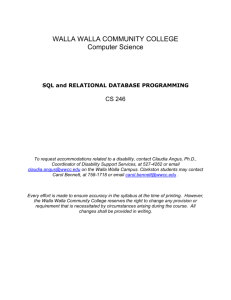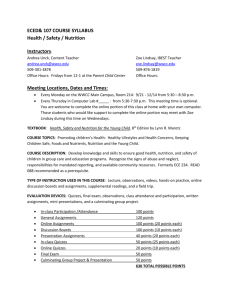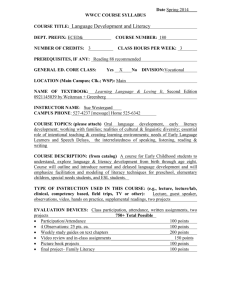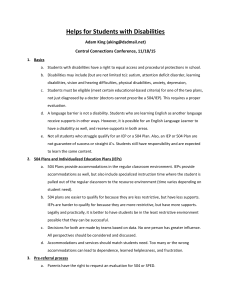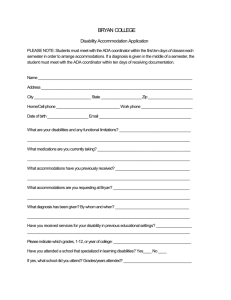View Syllabus - Walla Walla Community College
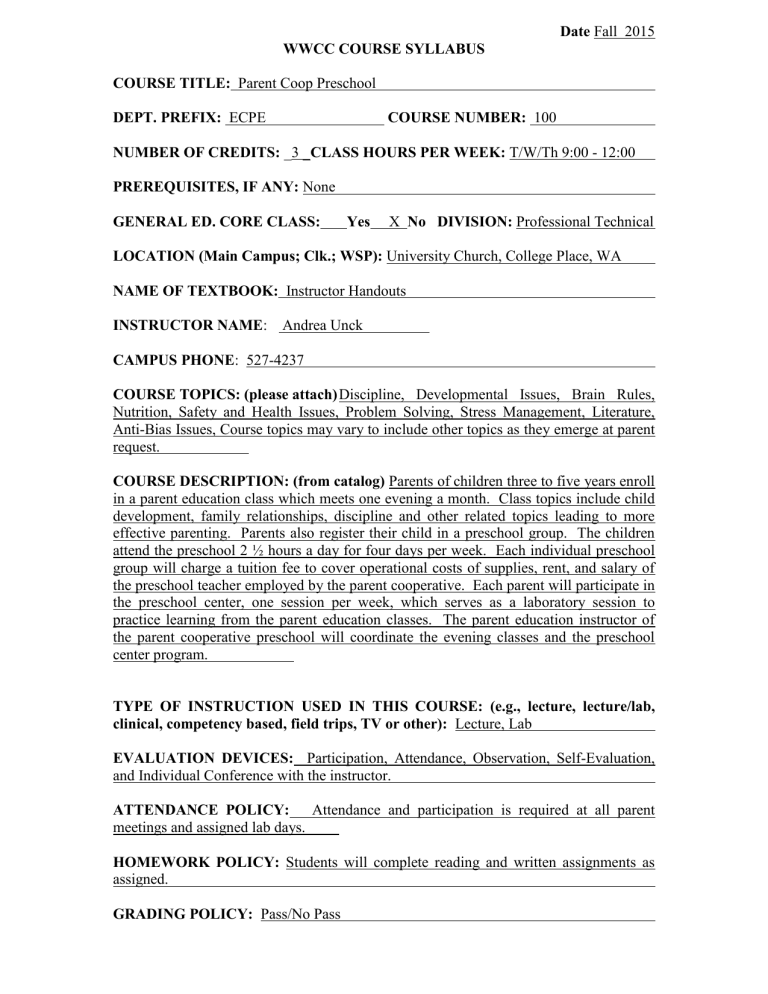
Date Fall 2015
WWCC COURSE SYLLABUS
COURSE TITLE: Parent Coop Preschool
DEPT. PREFIX: ECPE COURSE NUMBER: 100
NUMBER OF CREDITS: _3 _ CLASS HOURS PER WEEK: T/W/Th 9:00 - 12:00
PREREQUISITES, IF ANY: None
GENERAL ED. CORE CLASS: Yes X No DIVISION: Professional Technical
LOCATION (Main Campus; Clk.; WSP): University Church, College Place, WA
NAME OF TEXTBOOK: Instructor Handouts
INSTRUCTOR NAME : Andrea Unck
CAMPUS PHONE : 527-4237
COURSE TOPICS: (please attach) Discipline, Developmental Issues, Brain Rules,
Nutrition, Safety and Health Issues, Problem Solving, Stress Management, Literature,
Anti-Bias Issues, Course topics may vary to include other topics as they emerge at parent request.
COURSE DESCRIPTION: (from catalog) Parents of children three to five years enroll in a parent education class which meets one evening a month. Class topics include child development, family relationships, discipline and other related topics leading to more effective parenting. Parents also register their child in a preschool group. The children attend the preschool 2 ½ hours a day for four days per week. Each individual preschool group will charge a tuition fee to cover operational costs of supplies, rent, and salary of the preschool teacher employed by the parent cooperative. Each parent will participate in the preschool center, one session per week, which serves as a laboratory session to practice learning from the parent education classes. The parent education instructor of the parent cooperative preschool will coordinate the evening classes and the preschool center program.
TYPE OF INSTRUCTION USED IN THIS COURSE: (e.g., lecture, lecture/lab, clinical, competency based, field trips, TV or other): Lecture, Lab
EVALUATION DEVICES: Participation, Attendance, Observation, Self-Evaluation, and Individual Conference with the instructor.
ATTENDANCE POLICY: Attendance and participation is required at all parent meetings and assigned lab days.
HOMEWORK POLICY: Students will complete reading and written assignments as assigned.
GRADING POLICY: Pass/No Pass
OTHER SPECIAL INSTRUCTIONS/INFORMATION:
1.
All cell phones & communication devices will be turned off.
2.
The instructor reserves the right to change this syllabus during the course of the
3.
quarter.
All students will respect the opinions of others.
4.
All dialogue will be conducted in an orderly fashion.
5. All students will contribute to a supportive learning environment.
LEARNING OUTCOMES EXPECTED OF STUDENTS AT THE COMPLETION
OF THIS COURSE:
1] To develop realistic age-level expectations from knowledge of childhood behavior and growth. 2] Clarify child rearing values and attitudes and to explore methods of child guidance. 3] To identify and apply safe and healthy practices in the home including: nutrition, first aid, wellness, stress management, and risk management. 4] Experience and understand the role of parent involvement in maintaining quality learning environments for children. 5] Develop skills to interact with children using developmentally appropriate, culturally relevant and anti-bias practices. 6] Access community resources, share information concerning child-rearing and family resource management. 7] Discuss information on contemporary family concerns such as child abuse prevention, divorce, illness, and death. 8] Develop skills in group organization and leadership. Develop and/or increase confidence in managing the demanding role of parents in a changing society. 10] Strengthen family communication and relationships.
Please review the Standard Course Outline for this course (available from the Dean of Instruction Office). This course should as a minimum cover the topics included in the Standard Course Outline.
Americans with Disabilities Act Student Policies
Walla Walla Community College
It is the policy of Walla Walla Community College to comply with Section 504 of the
Rehabilitation Act of 1973 and the American with Disabilities Act of 1990. WWCC is committed to providing equal access and promoting an atmosphere conducive to academic success for all who can benefit from a post-secondary education. This includes assisting individuals with disabilities to achieve their full potential as students. WWCC provides support to integrate these students as fully as possible into all aspects of the campus community to maximize their independence and educational experience.
The American with Disabilities Act was signed into law in 1990. The ADA’s protection applies primarily, but not exclusively, to disabled individuals. An individual is disabled if he or she meets any one of the following tests:
He/she has a physical or mental impairment that substantially limits one or more of his/her major life activities.
He/she has a record of such impairment.
He/she is regarded as having such an impairment
Students are obligated to follow well-established and publicized institutional procedures for obtaining accommodations. These are outlined below:
1. Self Identify
A student must give notice of the existence of a disability and make a direct and specific request for accommodations. If the student self identifies to a faculty member, the faculty member should ask the student to make an appointment with Claudia Angus,
Disabilities Coordinator, in order to start the procedure to request documentation of the disability.
The student will complete a confidential accommodation request form that is submitted to the Disabilities Coordinator. The student will list those who may have access to this confidential information about his/her disability. This may or may not include instructors.
Institutional Attitude: A suggested method to ease the way for a student to self-identify for accommodations is to include a statement on the syllabus such as: “If you have a disability and need accommodations, please see the instructor after class or contact
Claudia Angus, the Disabilities Coordinator.
2. Documentation
The need to provide accommodations does not arise until documentation is provided that establishes that the student has a disability and supports the need for the accommodations requested.
Qualified Professionals: Students must provide the necessary medical and diagnostic information from qualified professionals to support their requests for accommodations.
The documentation must sufficiently verify the existence of a disability defined under
ADA. In some instances, the disability is sufficiently obvious to verify the disability.
3. Assessment
Professional Consultation: The disabilities coordinator consults professionals at
WWCC and elsewhere in determining the accommodations given the student.
4.
Accommodations
After professional documentation is received and evaluated, an individualized accommodations list is prepared that is appropriate to the nature and the extent of the student’s disability. The student will give the accommodations list to individual instructors as desired. The nature of the student’s disability does not have to be revealed to the instructor.
Reasonable: A reasonable accommodation is a modification or adjustment to a course, program, service, activity or facility that enables a qualified student with a disability to have an equal opportunity. The college must be given a reasonable amount of time to respond to an accommodation request.
For additional information about students with disabilities or about accommodations, please contact:
Claudia Angus, Disabilities Coordinator
Office #: 133D
Phone: 527-4543 claudia.angus@wwcc.edu
For appointments please call: 527-4262
Walla Walla Community College is committed to provide equal opportunity and nondiscrimination for all educational and employment applicants as well as for its students and employed staff, without regard to race, color, creed, national origin, sex, sexual orientation, including gender expression/identity, marital status, age (over 40), the presence of any sensory, mental, or physical disability, the use of trained guide dog or service animal by a person with a disability, or status as a Vietnam and/or disabled veteran, National Guard member or reservist in accordance with the Civil Rights Act of 1964, Title IX of the Education Amendments of 1972, the
Federal Rehabilitation of 1973, the Americans with Disabilities Act of 1990, and any other applicable Federal and Washington State laws against discrimination .

